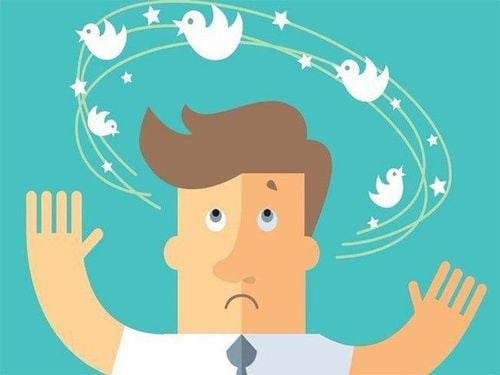This is an automatically translated article.
Dizziness is a term used to describe a range of sensations, such as feeling dizzy, light-headed, or having trouble keeping your balance. Dizziness creates the false feeling that you or your surroundings are moving.1. Signs of dizziness
Dizziness is more common in older people. Frequent episodes of lightheadedness or persistent dizziness can have a significant impact on your life. However, you should not worry too much because dizziness is not usually a warning sign of a serious health condition.People with vertigo may have sensations such as:
False sensations of movement or spinning (dizziness) A blank mind The body is off balance A feeling of spinning, awkwardness, or heaviness in the head These sensations may appear or get worse when walking, standing, or moving your head. The dizziness may be accompanied by nausea or be so severe that you need to sit or lie down. Dizziness can last for a few seconds or days and can recur.

Dấu hiệu chóng mặt khiến bạn cảm thấy quay cuồng
2. Having a lot of dizziness, when should you go to the doctor?
You should see your doctor if your vertigo is recurrent, sudden, severe, or persistent and has no known cause. When the following symptoms appear along with dizziness, you need to go to a medical facility immediately for examination and treatment:Sudden dizziness, severe headache Chest tightness Shortness of breath Numbness or paralysis of the wings hands or feet Fainting Decreased vision Fast or irregular heartbeat Confusion or slurred speech Unsteadiness or difficulty walking Continual vomiting Seizures Hearing changes Face numbness
3. Causes of dizziness
Dizziness has many causes, including inner ear disorders, motion sickness, and medication effects. Sometimes this is caused by an underlying health condition, such as poor circulation, an infection, or an injury.The cause of dizziness may be due to a disturbance in the inner ear that regulates the balance of the body. When moving the head, the inside of the ear will indicate the head position, sending signals to the brain to maintain balance. If there is a problem inside the ear, the patient will have symptoms of pain, dizziness.
Benign position vertigo (BPPV). This condition causes a false sense that you are spinning or moving. This sensation occurs due to a rapid change in head movement, such as when you roll over in bed, sit up, or get hit in the head. BPPV is the most common cause of vertigo. Infection. Vestibular neuritis can cause intense and constant dizziness. If you have sudden hearing loss, you may have labyrinthitis. Meniere's disease. This disease involves an excessive accumulation of fluid in your inner ear. It is characterized by sudden attacks of dizziness that last up to several hours. You may also experience fluctuating hearing loss, tinnitus. Migraine pain. People with migraines may experience dizziness even when they don't have a severe headache. Such episodes of vertigo can last from a few minutes to several hours. You may feel dizzy, faint, or lose your balance if your heart isn't pumping enough blood to your brain. Causes include:
Decreased blood pressure. A significant drop in systolic blood pressure — the higher number in your blood pressure reading — can lead to lightheadedness or a feeling of fainting. Dizziness can occur after sitting up or standing too quickly. This condition is also known as orthostatic hypotension. Poor blood circulation. Conditions such as cardiomyopathy, heart attack, arrhythmia, and cerebral ischemia can cause dizziness. A decrease in blood volume can cause insufficient blood flow to your brain or inner ear.

Tụt huyết áp có thể gây chóng mặt
Nervous disorders. Certain neurological conditions - such as Parkinson's disease and multiple sclerosis - can lead to progressive imbalance. Medicine . Dizziness can be a side effect of certain medications - such as antiepileptic drugs, antidepressants, tranquilizers. In particular, antihypertensive drugs can cause fainting if the patient lowers blood pressure too much. Anxiety disorders . Some anxiety disorders can cause dizziness or lightheadedness. Anemia . Other signs and symptoms that may accompany dizziness if you have anemia include fatigue, moodiness, and pale skin. Low blood sugar (hypoglycemia). This condition often occurs in people with diabetes who use insulin. Dizziness can be accompanied by sweating and anxiety. Overheating and Dehydration. If you are active in hot weather or if you don't drink enough water, you may feel dizzy from overheating (hyperthermia) or from dehydration.
4. Factors that increase the risk of dizziness
Factors that may increase the risk of dizziness include:Age. Older adults are more likely to have medical conditions that cause dizziness, especially a feeling of loss of balance. They are also more likely to take medications that can cause dizziness. Ever had dizziness: If you've had dizziness before, the vertigo is likely to recur.
5. Complications due to dizziness
Dizziness can increase your risk of falling and causing injury. Getting dizzy while driving or operating heavy machinery can increase the chance of an accident. You may also experience long-term consequences if an existing health condition, such as anemia or a neurological disorder that causes dizziness, is left untreated.Department of Medical Examination and Internal Medicine - Vinmec International General Hospital holds specialized functions in the examination and treatment of diseases related to the central nervous system (cranial, meninges, brain, cerebral blood vessels, nerves in the skull, pituitary gland, spine, discs, spinal cord) and peripheral nervous system (nerves and ganglia outside the brain and spinal cord).
Customers can directly go to Vinmec Health system nationwide to check when having symptoms of dizziness and neurological disorders or contact the hotline HERE for support.
References: Mayoclinic.org













